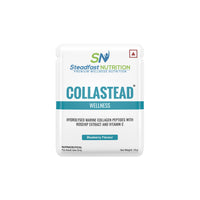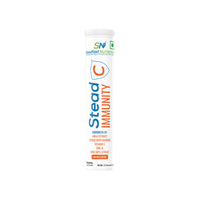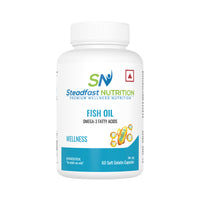Table of Content
1. Common Causes of Joint Pain
2. Best Supplements for Joint Health
3. How to Choose the Right Supplement for Joint Health
4. Conclusion
5. FAQs
Ageing is an inevitable process but having issues related to it can be managed with care and the right nutrition at the right time. So, when it comes to joints or joint health it is very important to focus on the kind of foods and supplements for joint health that can help strengthen the skeletal system. Healthy joints enable mobility and independence, as we age our joints tend to lose that agility to regenerate tissues that help support joint movements. This also applies to athletes who put a lot of stress on their bones which can lead to joint problems in the long run if not taken care of properly. So, read on to learn about the key factors to keep in mind for safeguarding joint health.
Common Causes of Joint Pain
Different types of pain can have multiple causes but when it comes to joint pain there are a few defined causes that might be the triggering point for the pain you feel. Here's a list of causes of joint pain.
1. Osteoarthritis (OA)
It's a degenerative joint disease caused by wear and tear in cartilages that cushion the joint over time, which might lead to stiffness and pain. If the disease condition worsens over time, the main joints that osteoarthritis affects are the knees, hips, hands, lower back, wrists and feet.
2. Rheumatoid Arthritis (RA)
This is an autoimmune disorder in which the body’s immune system starts attacking joint tissues and linings, further causing inflammation, swelling, and potential joint deformity. This chronic disorder affects several joints, such as those of the feet and hand.
3. Gout
It is a form of arthritis caused by the build-up of uric acid crystals in the joints, which causes inflammation after deposition. The accumulation of these crystals flares up inflammation around joints which can cause sudden or intense pain often affecting the joints of the big toe.
4. Bursitis
It is the inflammation of fluid-filled sacs that cushion the joints, occurring due to the overuse or repeated movements of these joints mainly in the hips, knees, elbows, and shoulders.
5. Tendinitis
It is marked by the inflammation of tendons due to repetitive motion or strain mostly occurring in the elbow, heel, or shoulder.
6. Injuries or Infections
Injury can lead to joint pain in the long run, like fractures, sprains, strains, or ligament tears, such as an ACL injury in athletes. Another cause of joint pain is viral infections such as hepatitis B and C as these are linked to inflammation and immune system responses in the body.
Best Supplements for Joint Health
It is important to include certain supplements for joint health to maintain healthy joints that help prevent pain due to weaker joints. So, here's a list of supplements that can be your ally for stronger joints and joint pain relief.
1. Omega-3
Omega-3 fatty acids comprise eicosapentaenoic acid (EPA) and docosahexaenoic acid (DHA), which are found in fish oil, fatty fish, walnuts and flax seeds. Omega-3 has powerful anti-inflammatory properties that help with issues like joint pain, stiffness, and swelling. It is helpful with situations like rheumatoid arthritis (RA), as it helps prevent inflammation in joints and may help decrease reliance on pain relievers.
A 2020 study published in the journal Rheumatology Advances in Practice found that fish oil supplements significantly reduce osteoarthritis (OA)-related pain, but further research is required to substantiate. Also, omega-3 capsules help resolve the issue of inflammation and joint discomfort with the production of resolvins.
Most research studies have concluded that one can take 500 to 1000 mg omega-3 for positive health benefits. One can take an omega 3 capsule or dietary sources of omega-3, including salmon, tuna, sardines, flaxseeds, walnuts, and tofu to fulfil the requirements.
2. Curcumin
Turmeric has an active compound, curcumin, a powerful anti-inflammatory agent that helps relieve joint pain and stiffness, particularly in osteoarthritis (OA) and rheumatoid arthritis (RA). It blocks inflammatory enzymes or modulates inflammation-causing pathways preventing the joints from getting inflamed.
A 2021 study published in PubMed Central established that taking curcumin daily can help reduce arthritis-related pain and improve mobility. However, curcumin is poorly absorbed by the body so it should be taken with black pepper or healthy fats. One such supplement is Steadfast Nutrition’s Curcumin which provides 500 mg of curcumin and 5 mg of piperine to boost immunity and reduce inflammation. Turmeric is a natural alternative for managing joint inflammation, but its effectiveness varies, and further studies are needed for validation.
3. Collagen supplement
Collagen is a protein made from amino acids that helps maintain joint structure and flexibility. Type II collagen is a part of the cartilage, bone and other types of connective tissues. Collagen supplements help prevent joint and bone health issues, as they help overcome muscle soreness and strengthen ligaments and tendons.
The products are available in powder, liquid, and capsule forms; they can be more effective when combined with a diet rich in protein and vitamin C like chicken, bone broth, fish, and citrus fruits like lemon. As per research published in International Orthopaedics (2019), it was indicated that taking collagen led to significant improvements in joint stiffness but not pain or functional limitation.
CollaStead by Steadfast Nutrition is one product that can be included in the daily routine. It comes in two refreshing flavours: fruit punch & blueberry. Collastead is enriched with (type 1) marine collagen peptides, which improve skin elasticity, reduce signs of ageing, and support joint, ligament, tendon, and cartilage movement.
4. Vitamin D
Vitamin D aids calcium absorption in the body which plays an important role in joint and bone health in the long run, maintaining bone density and strength. A deficiency of vitamin D is linked to worsening of arthritis symptoms, particularly rheumatoid arthritis (RA), and may contribute to chronic joint pain and inflammation. The lack of enough dietary sources of vitamin D and limited sun exposure due to the modern lifestyle has left the only alternative — supplementation with vitamin D capsules. People with a higher risk of arthritis or osteoporosis need to maintain a desired level of vitamin D in the body to keep it functioning. Maintaining adequate vitamin D levels can support joint mobility, reduce discomfort, and enhance overall musculoskeletal health. Consuming supplements which come in the form of vitamin D capsules or Vitamin D tablets in the form of supplements as advised by your healthcare professional may help overcome the deficiency lowering the symptoms.
5. Vitamin C
Vitamin C is essential for collagen production and makes up a key component of cartilage, making it one of the important supplements for joint health. Vitamin C is also a powerful antioxidant that helps reduce inflammation and oxidative stress in the body that in the long run might link up to conditions like osteoarthritis (OA) and rheumatoid arthritis (RA) and helps reduce inflammation levels.
With adequate vitamin C levels, consuming a vitamin C tablet within safe limits may help support immune function. The recommended dietary allowance for vitamin C is 80 mg daily, which promotes wound healing and strengthens immune function. Adding citrus fruits and vegetables along with supplements can be beneficial for maintaining the optimal levels for athletes and individuals with joint pain.
SteadC is one such supplement that helps boost immunity, reduces inflammation, helps in wound healing, promotes skin health, and enhances iron absorption, enhancing overall well-being. It provides 40 mg of vitamin C that helps synthesise collagen fibres, which support connective tissue healing. Zinc in SteadC promotes faster healing of wounds. The effervescent formulation makes it easy to consume and comes in a refreshing orange flavour that can be taken anytime during the day.
6. Calcium
Calcium as we all know provides a strong foundation for healthy bones and joints preserving bone mineral density which reduces the risk of osteoporosis and fractures. With ageing losing the bone density part is very normal for women so to tackle the health challenge, calcium is one of the most opted supplements. The most affected joints are the weight-bearing joints like the hips, knees, and spine so having appropriate calcium is a great way to maintain healthy bones and joints.
The RDA for all adults 19-50 years old and for males 51-70 years of age is 1000 mg. For females 51 years and older, the RDA is 1200 mg. While, for pregnant and breastfeeding women, the RDA is 1000 mg and 1200 mg respectively.
It is important to note that the dosage shouldn't exceed 2500 mg daily unless prescribed by a doctor. Natural sources of calcium are dairy, leafy greens and fortified foods.
7. Magnesium
Magnesium is an important element for bone health and nerve function that support joint health. Magnesium deficiency might lead to the risk of arthritis and joint discomfort as it is good for cartilage repair, reducing bone friction and joint stiffness. Moreover, low magnesium levels can hinder calcium absorption, leading to poor joint and bone health. That is why it is important to take magnesium from supplements or dietary sources.
The recommended dietary allowance for magnesium is 370 mg and 440 mg for adult women and men respectively, whereas for pregnant women, the RDA is 440 mg/ day.
Leafy greens, nuts, and seeds are excellent dietary sources of magnesium that can be included in the diet.
8. Vitamin K
The importance of vitamin K beyond its role in blood clotting for human health has been established through research studies. A 2019 study published in the Journal of Osteoporosis suggests vitamin K improves bone health by increasing bone mineral density and reducing fracture rates in individuals with osteoporosis. Further, vitamin K and vitamin D work synergistically in maintaining bone density. It is one of the best supplements for joint health as it plays a key role in the bone mineralisation of calcium by promoting the synthesis of a protein called osteocalcin, which helps the bones absorb calcium.
The recommended dietary intake of vitamin K is 55 μg per day. It can be obtained from broccoli, kale, cabbage, Brussels sprouts, liver, and legumes.
9. Vitamin B12
Vitamin B12 helps in red blood cell production and nerve function; its deficiency leads to nerve-related issues, causing tingling and numbness in hands and legs which may lead to mild bone or joint pain. This vitamin is crucial for neurological function. Hence, its deficiency may worsen fatigue conditions in people with rheumatoid arthritis. Since vitamin B12 is mostly found in non-veg foods, vegetarians or vegans must look out for options to fulfil their unmet needs for this key vitamin. As it helps with nerve-related joint discomfort it inevitably averts joint pain or is good for joint health.
How to Choose the Right Supplement for Joint Health
One needs to choose the supplements they require according to their daily dietary requirement, health status and lifestyle. Multivitamins provide a general foundation with broad spectrum components, unlike targeted supplements like omega-3s, Vitamin D and magnesium that offer specific health benefits like joint pain, inflammation, and mobility.
- You can choose a single nutrient or multiple target nutrients as per your requirement after consulting a healthcare professional.
- These supplements come in different formats - pills, powders, or liquids that can be chosen as per convenience, and ease of use and do not possess side effects like stomach discomfort after consumption.
- Opt a reliable brand to buy supplements for joint health.
- Check for authenticity - lab test reports and accreditations and products that are free from additives, heavy metals or steroids.
Conclusion
Joint health is important for mobility, flexibility and overall healthy living. Following preventive care steps like indulging in good nutrition, exercise and using supplements for joint health is the best approach. These joint support supplements that lower joint pain symptoms like curcumin, collagen, omega-3s, and vitamin B12 can promote long-term joint health, supporting joint function and reducing inflammation and provide joint pain relief. However, it is important to keep in mind that one shouldn't just rely on supplements as the only source of these nutrients. Supplements should only be additions to a balanced diet, regular physical activity, and a healthy lifestyle.
FAQs
1. Can Supplements for Joint Health Eliminate Joint Pain?
Supplements are no magic potion. While they can definitely help manage and reduce joint pain to some extent if caused by inflammation or nutrient deficiencies,
supplements for joint health are not the cure for the problem and won't be able to wipe out the disease completely. However, they can definitely make your life easier, lowering symptoms. But, we also need to focus on having a healthy diet for better recovery.
2. How Long Does It Take for Supplements for Joint Pain to Work?
There is no set timing in regard to the efficacy of supplements, every individual has their own pace to respond to the supplement taken along with the type and dosage.
The only thing that needs to be kept in check is the uninterrupted use of the supplement for optimal results.
3. Are There Any Foods That Help with Joint Health?
Yes, there are certain food items that are rich in nutrients and good for joint health. Here's a list of foods that you may include to get these nutrients.
- Omega-3-rich foods: Fatty fish (salmon, mackerel), walnuts, flaxseeds
- Vitamin C-rich foods: Citrus fruits, bell peppers, strawberries, guava, gooseberry
- Collagen-boosting foods: Bone broth, chicken, eggs, leafy greens
- Anti-inflammatory spices: Turmeric, ginger, black pepper
- Vitamin D & calcium sources: Dairy, fortified foods, mushrooms
- Magnesium-rich foods: Nuts, seeds, whole grains





